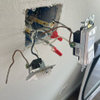What to do about non-existent grounding?
swampwiz
14 years ago
Related Stories

GROUND COVERSGround Force: 10 Top Ground Covers for Your Garden
Protect your soil from weeds and drought this summer with a living mulch of ground covers
Full Story
CONTRACTOR TIPSBuilding Permits: What to Know About Green Building and Energy Codes
In Part 4 of our series examining the residential permit process, we review typical green building and energy code requirements
Full Story
GARDENING GUIDESNew Ways to Think About All That Mulch in the Garden
Before you go making a mountain out of a mulch hill, learn the facts about what your plants and soil really want
Full Story
WORKING WITH PROSWhat Do Landscape Architects Do?
There are many misconceptions about what landscape architects do. Learn what they bring to a project
Full Story
GREEN BUILDINGWhat's LEED All About, Anyway?
If you're looking for a sustainable, energy-efficient home, look into LEED certification. Learn about the program and its rating system here
Full Story
LIGHTINGWhat to Know About Switching to LED Lightbulbs
If you’ve been thinking about changing over to LEDs but aren't sure how to do it and which to buy, this story is for you
Full Story
FURNITUREHow to Buy a Quality Sofa That Will Last
Learn about foam versus feathers, seat depth, springs, fabric and more for a couch that will work for years to come
Full Story
MATERIALSInsulation Basics: What to Know About Spray Foam
Learn what exactly spray foam is, the pros and cons of using it and why you shouldn’t mess around with installation
Full Story
WORKING WITH PROS10 Things Decorators Want You to Know About What They Do
They do more than pick pretty colors. Here's what decorators can do for you — and how you can help them
Full Story
BUDGETING YOUR PROJECTConstruction Contracts: What to Know About Estimates vs. Bids
Understanding how contractors bill for services can help you keep costs down and your project on track
Full Story







Billl
brickeyee
Related Professionals
Bound Brook General Contractors · Forest Hills General Contractors · Hamilton Square General Contractors · Jefferson Valley-Yorktown General Contractors · Los Lunas General Contractors · Markham General Contractors · Mentor General Contractors · Oneida General Contractors · La Mirada Solar Energy Systems · Fayetteville Home Automation & Home Media · Gages Lake Home Automation & Home Media · Hanover Home Automation & Home Media · Hull Home Automation & Home Media · Massapequa Home Automation & Home Media · Miami Springs Home Automation & Home MediaswampwizOriginal Author
brickeyee
westom
brickeyee
westom
Billl
brickeyee
westom
brickeyee
DavidR
Ron Natalie